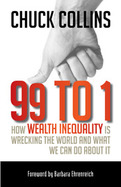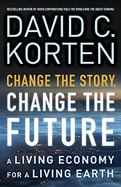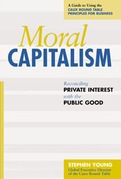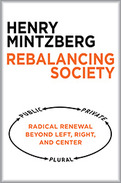2011
Recounting controversial First Amendment cases from the Red Scare era to Citizens United, William Bennett Turner shows how weve arrived at our contemporary understanding of free speech. His strange cast of heroes and villains, some drawn from cases he has litigated, includes Communists, Jehovahs Witnesses, Ku Klux Klansmen, the worlds leading pornographer, prison wardens, dogged reporters, federal judges, a computer whiz, and a countercultural comedian. This is a fascinating look at how the scope of our First Amendment freedoms has evolved and the colorful characters behind some of the most important legal decisions of modern times.
2012
Brings together facts and figures showing what "the 99% and the 1%" divide means in the real world and the damage it causes.
Over the past thirty years, we’ve seen a radical redistribution of wealth upward to a tiny fraction of the population. Here, activist Chuck Collins explains how it happened and marshals wide-ranging data to show exactly what the 99/1 percent divide means in the real world and the damage it causes to individuals, businesses, and the earth. Most important, he answers the burning question, what can be done about it? He offers a common-sense guide to bringing about a society that works for everyone: the 100 percent. This is a struggle that can be won. After all, the odds are 99 to 1 in our favor.
Korten calls our current story Sacred Money and Markets. Money, it tells us, is the measure of all worth and the source of all happiness. Earth is simply a source of raw materials. Inequality and environmental destruction are unfortunate but unavoidable. Although many recognize that this story promotes bad ethics, bad science, and bad economics, it will remain our guiding story until replaced by one that aligns with our deepest understanding of the universe and our relationship to it.
To guide our path to a viable human future, Korten offers a Sacred Life and Living Earth story grounded in a cosmology that affirms we are living beings born of a living Earth itself born of a living universe. Our health and well-being depend on an economy that works in partnership with the processes by which Earth's community of life maintains the conditions of its own existence—and ours. Offering a hopeful vision, Korten lays out the transformative impact adopting this story will have on every aspect of human life and society.
2003
- Shows how to ensure that capitalism promotes progress and equality rather than enriching the few at the expense of many
- Based on principles developed by the Caux Round Table, an international network of senior business executives from such companies as 3M, Canon, NEC, Bankers Trust, Shell, Prudential, and dozens of other companies
- Provides practical guidelines for corporate social responsibility through the Caux Round Table's Seven General Principles for Business
2007
2014
With the collapse of the communist regimes of Eastern Europe, Western pundits declared that capitalism had triumphed. They were wrong—balance triumphed. A healthy society balances a public sector of respected governments, a private sector of responsible businesses, and a plural sector of robust communities. Communism collapsed under the weight of its overbearing public sector.
Now the “liberal democracies” are threatened—socially, politically, even economically—by the unchecked excesses of the private sector.
Radical renewal will have to begin in the plural sector, which alone has the inclination and the independence to challenge unacceptable practices and develop better ones. Too many governments have been co-opted by the private sector. And corporate social responsibility can't compensate for the corporate social irresponsibility we see around us “They” won't do it. We shall have to do it, each of us and all of us, not as passive “human resources,” but as resourceful human beings.
Tom Paine wrote in 1776, “We have it in our power to begin the world over again.” He was right then. Can we be right again now? Can we afford not to be?















